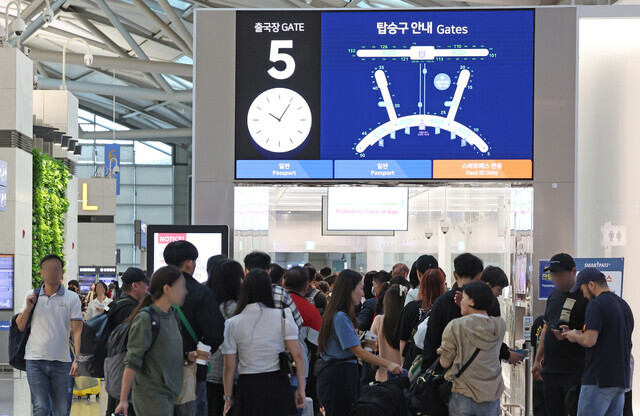hankyoreh
Links to other country sites 다른 나라 사이트 링크
Almost 20,000 Koreans settled abroad in last 5 years – 80% chose places with this in common

Data has shown that more than 17,000 South Koreans have moved abroad in the last five years, with the US as the most popular destination.
The Hankyoreh on Sunday analyzed data provided to Democratic Party lawmaker Hwang Hee by the Ministry of Foreign Affairs. According to our findings, 17,664 Koreans reported moving abroad in the five-year period from 2018 to 2022.
After reaching 6,664 in 2018, the number of Koreans migrating overseas decreased to 4,412 in 2019 and 1,941 in 2020, but rebounded slightly to 2,015 in 2021 and 2,632 in 2022.
When categorized by type of migration under the Emigration Act, “locally obtained emigration” accounted for 14,725 people over the five-year period. Locally obtained emigration refers to emigration by those who left the country for purposes other than emigration but stayed in the country and obtained a permanent residence permit or equivalent long-term residence status.
There were 1,938 “relationship-based emigrations” who emigrated based on marriage or kinship, and 1,001 “non-relationship-based emigrations” who emigrated for reasons such as employment contracts or business with foreign companies.
By country, the US was the most popular choice, with 8,458 (47.9%) of reported emigrants choosing to settle in the US. This was followed by Canada (3,552; 20.1%), Australia (1,415; 8.0%), Japan (1,150; 6.5%), and New Zealand (722; 4.1%). About 80% of Korean emigrants were concentrated in English-speaking countries.
“It is natural to see an increase in emigration in the current global era, but this data also reflects the limitations of South Korean society, where citizens face fierce competition for survival, anxiety about the future, and difficulties in expressing individual diversity,” said Hwang.
“We must create measures on a national scale to create high-quality jobs in South Korea and prevent the outflow of invaluable human resources,” the lawmaker added.
By Lee Seung-jun, staff reporter
Please direct questions or comments to [english@hani.co.kr]

Editorial・opinion
![[Column] Tariffs on China: Trump was dumb, Biden dumber [Column] Tariffs on China: Trump was dumb, Biden dumber](https://flexible.img.hani.co.kr/flexible/normal/500/300/imgdb/original/2024/0520/191716191153918.jpg) [Column] Tariffs on China: Trump was dumb, Biden dumber
[Column] Tariffs on China: Trump was dumb, Biden dumber![[Column] What if Seoul took reunification by force off the table? [Column] What if Seoul took reunification by force off the table?](https://flexible.img.hani.co.kr/flexible/normal/500/300/imgdb/original/2024/0520/3017161928630494.jpg) [Column] What if Seoul took reunification by force off the table?
[Column] What if Seoul took reunification by force off the table?- [Editorial] Intensifying US-China rivalry means Seoul must address uncertainty with Beijing sooner than later
- [Column] When ‘fairness’ means hate and violence
- [Editorial] Yoon must stop abusing authority to shield himself from investigation
- [Column] US troop withdrawal from Korea could be the Acheson Line all over
- [Column] How to win back readers who’ve turned to YouTube for news
- [Column] Welcome to the president’s pity party
- [Editorial] Korea must respond firmly to Japan’s attempt to usurp Line
- [Editorial] Transfers of prosecutors investigating Korea’s first lady send chilling message
Most viewed articles
- 1Xi, Putin ‘oppose acts of military intimidation’ against N. Korea by US in joint statement
- 2For new generation of Chinese artists, discontent is disobedience
- 3[Editorial] Transfers of prosecutors investigating Korea’s first lady send chilling message
- 4[Column] When ‘fairness’ means hate and violence
- 5[Editorial] Intensifying US-China rivalry means Seoul must address uncertainty with Beijing sooner t
- 6How K-pop broke the internet — and broke into the US market
- 7[Exclusive] Unearthed memo suggests Gwangju Uprising missing may have been cremated
- 8‘Shot, stabbed, piled on a truck’: Mystery of missing dead at Gwangju Prison
- 9Naver to acquire Canada’s Wattpad to fuel its IP ambitions
- 10AI, robots won’t free us from work - they’ll make our jobs worse